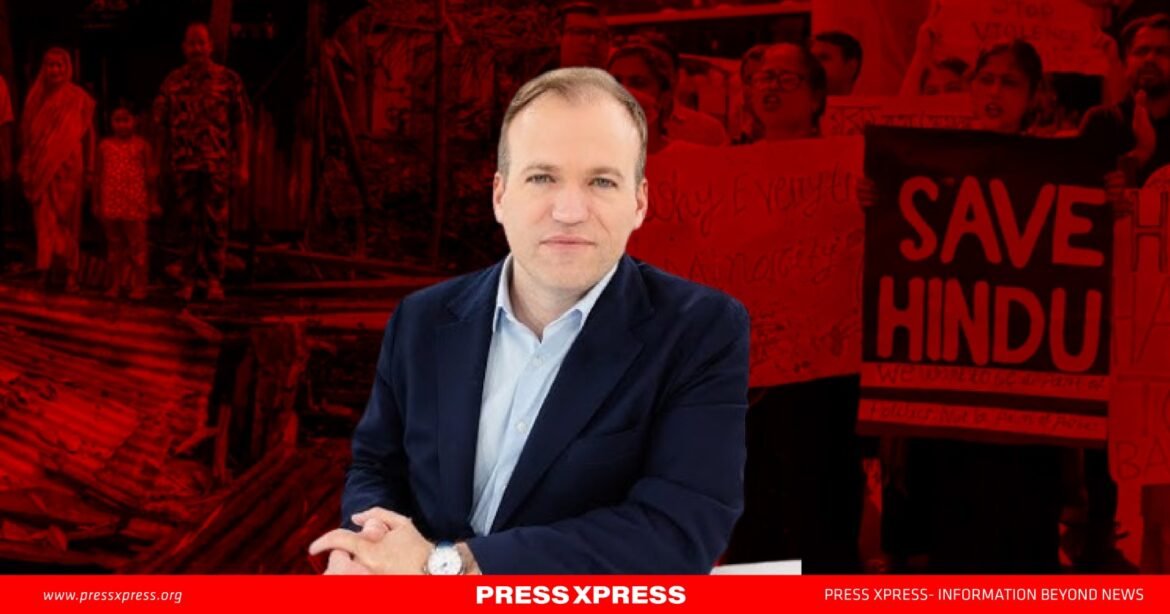Johnnie Moore, former U.S. Commissioner on International Religious Freedom (USCIRF), has raised concerns over the rising violence against religious minorities in Bangladesh under Dr. Yunus’s interim government, warning that the situation is not just a threat to the country’s minority communities but to its stability as a whole. In an interview with ANI, Moore stated that the country’s minorities are facing an “existential threat,” urging the international community to pay more attention to the situation.
Moore’s comments come at a time when the Hindu community in Bangladesh is grappling with escalating attacks, including the arrest and detention of Chinmoy Krishna Das, a prominent religious leader advocating for the rights of Hindus. Moore criticized the lack of response from the current U.S. administration, calling it a failure of foreign policy that has neglected important issues such as religious freedom. He noted that one of the main reasons for the upcoming change in U.S. leadership was the current administration’s failure to address such pressing global concerns.
A Shift in U.S. Foreign Policy
Looking ahead to the incoming Trump administration, Moore expressed confidence that there would be a stronger focus on human rights, particularly religious freedom. He emphasized that Donald Trump would bring with him a team of advocates who view India as a key ally in shaping the future of international relations. Moore suggested that a renewed U.S.-India partnership would be crucial for addressing global challenges, including the protection of religious minorities in countries like Bangladesh.
According to Moore, religious freedom was a central pillar of Trump’s first term in office, and he expects this to continue in the next administration. He believes that U.S. foreign policy, under Trump’s leadership, will align more closely with India’s values, helping to create a powerful alliance that can advocate for religious freedom on the global stage. This partnership, Moore argued, will be critical in addressing the ongoing persecution of religious minorities in countries like Bangladesh, where attacks on Hindus and other minorities have become increasingly frequent.
Bangladesh’s Struggle with Religious Persecution
Moore’s comments reflect growing concern over Bangladesh’s treatment of its minority communities. The arrest of Chinmoy Krishna Das, for instance, has sparked outrage among Hindus in the country. Das, a spokesperson for the Bangladesh Sammilita Sanatani Jagran Jote, was arrested after leading peaceful protests advocating for the rights of Hindus. His detention, followed by the denial of bail, has intensified fears among Bangladesh’s religious minorities, with many wondering whether they too could be targeted by authorities.
Moore pointed out that while human rights organizations have raised alarms about the persecution of Hindus worldwide, the global response has often been muted. He acknowledged that, unfortunately, when Hindus are persecuted, the international community often remains silent. This, he said, needs to change. Moore has committed to amplifying the voices of the Hindu community and called on global human rights and religious freedom organizations to do the same.
India has also expressed its concern over the treatment of minorities in Bangladesh, particularly following the attacks on Hindu homes, businesses, and places of worship. The Indian Ministry of External Affairs issued a statement condemning the violence and calling for the immediate protection of minorities in Bangladesh. India also criticized the Bangladeshi authorities for failing to hold perpetrators accountable, while peaceful protests by minorities were met with arrests and violence.
International Implications and Calls for Action
Moore’s warnings serve as a reminder that the persecution of religious minorities in Bangladesh is not just a domestic issue but a global concern. He urged the U.S. to reassess its foreign policy towards Bangladesh, calling for a more vocal stance on human rights. The international community, Moore stressed, must speak out against the violence and support efforts to ensure that religious minorities in Bangladesh can live without fear of persecution.
As the situation in Bangladesh continues to unfold, the question of how the international community will respond remains critical. With the change in U.S. leadership on the horizon, there is potential for a shift in policy that could bring greater attention to the issue of religious freedom in Bangladesh. However, the effectiveness of such efforts will depend on whether the U.S. and its allies are willing to take meaningful action to hold the Bangladeshi government accountable for its treatment of religious minorities.
For Bangladesh, the path forward will require significant internal reforms and a commitment to protecting the rights of all its citizens. Whether the country can address these challenges, while maintaining its international relationships, remains to be seen. But for the global community, the calls for justice and human rights have never been more urgent.


